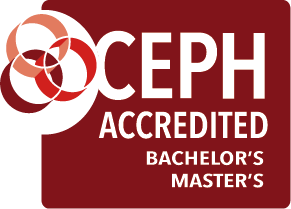Master of Public Health (MPH)
Lead in Public Health with a MPH Degree from UNF
The MPH degree is the most widely recognized professional credential for leadership positions in public health. This degree is appropriate for those who wish to pursue careers in epidemiology; in developing, planning, managing, or evaluating health promotion and disease prevention programs; in conducting public health related research; or advocating for public health policy. The UNF MPH Program is aligned with the Council on Education for Public Health’s (CEPH) 22 Foundational Competencies and offers concentrations in Epidemiology and Social and Behavioral Science.
Prepare for Diverse Public Health Careers
MPH graduates will be able to integrate and apply their knowledge to address public health problems and will possess skills and competencies necessary for public health practice in a wide range of public and private institutions. Graduates are typically employed in governmental or non-profit health agencies, health care facilities, or work site wellness programs. Graduates are eligible to become Certified in Public Health (CPH) by passing the CPH exam offered by the National Board of Public Health Examiners (NBPHE). Graduates are also eligible to become a Certified Health Education Specialist (CHES) by passing the exam offered by the National Commission for Health Education Credentialing (NCHEC).
Application Deadlines
|
Fall |
Fall |
READY TO UNLEASH YOUR POTENTIAL WITH UNF?
Program Information
-
MPH and BSH Program Mission and Vision
Vision Statement:
The vision of University of North Florida (UNF) Public Health Programs is to lead the way to a healthier world for all.
Mission Statement:
The mission of University of North Florida (UNF) Public Health Programs is to prepare public health professionals to improve the health and well-being of communities. This mission is accomplished through excellence and innovation in teaching and public health research with a commitment to diversity, community involvement, and professional service.
-
Admission Requirements
Admission Requirements
For admission requirements and information on how to apply, please visit
-
Course Sequence - Social and Behavioral Science
Major: Public Health
Concentration: Social & Behavioral Science
Program Format: The program is hybrid and requires approximately 50% face-to-face instruction and 50% online instruction. Students spend approximately 1-2 evenings per week in class. This format makes the Program very accessible to those working full-time while still providing meaningful interaction with faculty and peers. The full-time program can be completed in 2 years and the part-time in 3 years (fall, spring, and summer terms).
Notes: Following the course sequence is mandatory to graduate according to the schedule shown in the MPH Handbook for your cohort. Students must be prepared for subsequent courses and MPH courses are offered only once per year. Students who fail to follow the course sequence will delay their graduation by possibly a year or more. International students who do not follow the sequence will not be granted extensions of their stay in the U.S. and may forfeit their ability to complete the degree. When changes are made to the course sequence, appropriate accommodations will be made for students who might be adversely affected for reasons out of their control. The program is not obligated to make special accommodations for students who fail to follow the course sequence provided.
Social and Behavioral Science Concentration
Full-Time Students
Full-Time Students Social and Behavioral Science Concentration (Year 1) Fall 1 Spring 1 Summer 1 PHC 6000: Epidemiology I (M) PHC 6102: PH Policy and Advocacy (W) Elective 1 PHC 6050: Public Health Biostatistics I (T) HSC 6215: Environmental Health (M) Elective 2 HSC 6587: Public Health Planning (W) HSC 6585: Health Communication (T) - Full-Time Students Social and Behavioral Science Concentration (Year 2) Fall 2 Spring 2 Summer 2 HSC 6735: Public Health Research (T) HSC 6755: Data Analysis for Health Disparities (W) PHC 6945: Public Health Internship (T) HSC 6603: Theoretical Found of Beh Chg (W) HSC 6716: Health Program Evaluation (M) - PHC 6149: Leadership & Management (M) PHC 6940: Public Health Capstone (T) - Part-Time Students
Part-Time Students Social and Behavioral Science Concentration (Year 1) Fall 1 Spring 1 Summer 1 PHC 6050: Public Health Biostats I (T) HSC 6215: Environmental Health (M) Elective 1 HSC 6587: Public Health Planning (W) HSC 6685: Health Communication (T) - Part-Time Students Social and Behavioral Science Concentration (Year 2) Fall 2 Spring 2 Summer 2 PHC 6000: Epidemiology I (M) HSC 6716: Health Program Evaluation (M) Elective 2 HSC 6735: Public Health Research (T) PHC 6102: Public Health Policy & Advocacy (W) - Part-Time Students Social and Behavioral Science Concentration (Year 3) Fall 3 Spring 3 Summer 3 HSC 6603: Theoretical Found of Beh Chg (W) PHC 6940: Public Health Capstone (T) PHC 6945: Public Health Internship (T) PHC 6149: Leadership & Management (M) HSC 6755: Data Analysis for Health Disparities (W) - -
Course Sequence - Epidemiology
Major: Public Health
Concentration: Epidemiology
Program Format: The program is hybrid and requires approximately 50% face-to-face instruction and 50% online instruction. Students spend approximately 1-2 evenings per week in class. This format makes the Program very accessible to those working full-time while still providing meaningful interaction with faculty and peers. The full-time program can be completed in 2 years and the part-time in 3 years (fall, spring, and summer terms).
Notes: Following the course sequence is mandatory to graduate according to the schedule shown in the MPH Handbook for your cohort. Students must be prepared for subsequent courses and MPH courses are offered only once per year. Students who fail to follow the course sequence will delay their graduation by possibly a year or more. International students who do not follow the sequence will not be granted extensions of their stay in the U.S. and may forfeit their ability to complete the degree. When changes are made to the course sequence, appropriate accommodations will be made for students who might be adversely affected for reasons out of their control. The program is not obligated to make special accommodations for students who fail to follow the course sequence provided.
Epidemiology Concentration
Full-Time Students
Full-Time Students Epidemiology Concentration (Year 1) Fall 1 Spring 1 Summer 1 PHC 6000: Epidemiology I (M) PHC 6102: PH Policy and Advocacy (W) Elective 1 PHC 6050: Public Health Biostatistics I (T) HSC 6215: Environmental Health (M) Elective 2 HSC 6587: Public Health Planning (W) HSC 6585: Health Communication (T) - Full-Time Students Epidemiology Concentration (Year 2) Fall 2 Spring 2 Summer 2 HSC 6735: Public Health Research (T) PHC 6002: Infectious Disease Epi (M) PHC 6945: Public Health Internship (T) PHC 6051: Public Health Biostats II (W) PHC 6011: Epidemiology II (W) - PHC 6149: Leadership & Management (M) PHC 6940: Public Health Capstone (T) - Part-Time Students
Part-Time Students Epidemiology Concentration (Year 1) Fall 1 Spring 1 Summer 1 PHC 6050: Public Health Biostats I (T) HSC 6215: Environmental Health (M) Elective 1 HSC 6587: Public Health Planning (W) PHC 6102: Public Health Policy & Advocacy (W) - Part-Time Students Epidemiology Concentration (Year 2) Fall 2 Spring 2 Summer 2 PHC 6000: Epidemiology I (M) PHC 6011: Epidemiology II (W) Elective 2 HSC 6735: Public Health Research (T) HSC 6585: Health Communication (T) - Part-Time Students Epidemiology Concentration (Year 3) Fall 3 Spring 3 Summer 3 PHC 6051: Public Health Biostats II (W) PHC 6002: Infectious Disease Epi (M) PHC 6945: Public Health Internship (T) PHC 6149: Leadership and Management (M) PHC 6940: Public Health Capstone (T) - -
MPH Accreditation and Student Requirements
Program Accreditation & Professional Certification
The UNF Master of Public Health Program is nationally accredited by the Council on Education for Public Health (CEPH).
Applied Practice Experience
CEPH accredited programs are required to provide an Applied Practice Experience (APE). The UNF MPH Capstone and Internship consists of two 3-credit courses taken over 2 semesters. Students set up the APE in the spring semester (PHC 6940 Public Health Capstone) and complete the 150 internship hours in the summer semester (PHC 6945 Public Health Internship). The internship is the final culminating field experience required for the MPH degree and serves as an opportunity for the student to demonstrate competency attainment through applied practice experience. To accomplish the internship objectives, practice experiences must focus on selected competencies from CEPH’s 22 Foundational Competencies for all MPH students and Concentration Competencies for either Epidemiology or Social Behavioral Science.
Integrative Learning Experience
CEPH accredited programs are required to provide an Integrative Learning Experience. During the last spring semester in the program, students will individually complete a comprehensive research paper. This research paper will serve as a culminating experience focusing on integrating and synthesizing the overarching public health competencies with the concentration specific competencies. It will address selected competencies from CEPH’s 22 Foundational Competencies for all MPH students and concentration competencies for either Epidemiology or Social and Behavioral Science. A minimum of two faculty per concentration will write directions, review and assess the research paper.
-
What does the program cost?
View the UNF controller's Tuition & Fees for the Graduate School website for detailed information about the MPH program cost.
Non-Florida residents may be eligible for an out-of-state tuition waiver. Contact the Program Director for additional information.
-
Assistantships and Scholarships
To view our assistantships and scholarships, please visit the BCH Assistantships website or the BCH Scholarship website.
Non-Florida residents may be eligible for an out-of-state tuition waiver. Contact the Program Director for additional information.
-
Eta Sigma Gamma Student Honor Society
Learn more about the Eta Sigma Gamma Student Honor Society by visiting the ESG website.
Additional Information
-
Resources for Public Health Students
Professional Public Health Organizations
- American Public Health Association (APHA)
- Society for Public Health Education
- CDC - What is Public Health?
- APHA - What is Public Health?
Employment Information
- American Public Health Association Job Listings
- Association of Schools of Public Health Jobs net
- Bureau of Labor Statistics: Occupational Outlook Handbook - Health Educators
- Bureau of Labor Statistics: Occupational Outlook Handbook - Epidemiologists
- Emory Public Health Employment Connection
- Health Promotion Career Network
Contact the Program Director

Elissa Barr
Professor, MPH Director
Public Health Department



